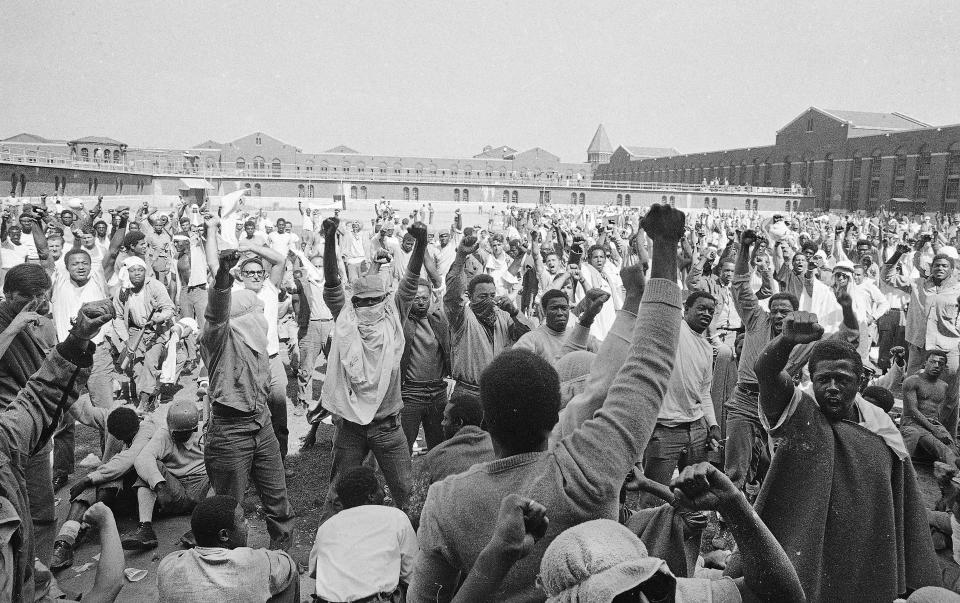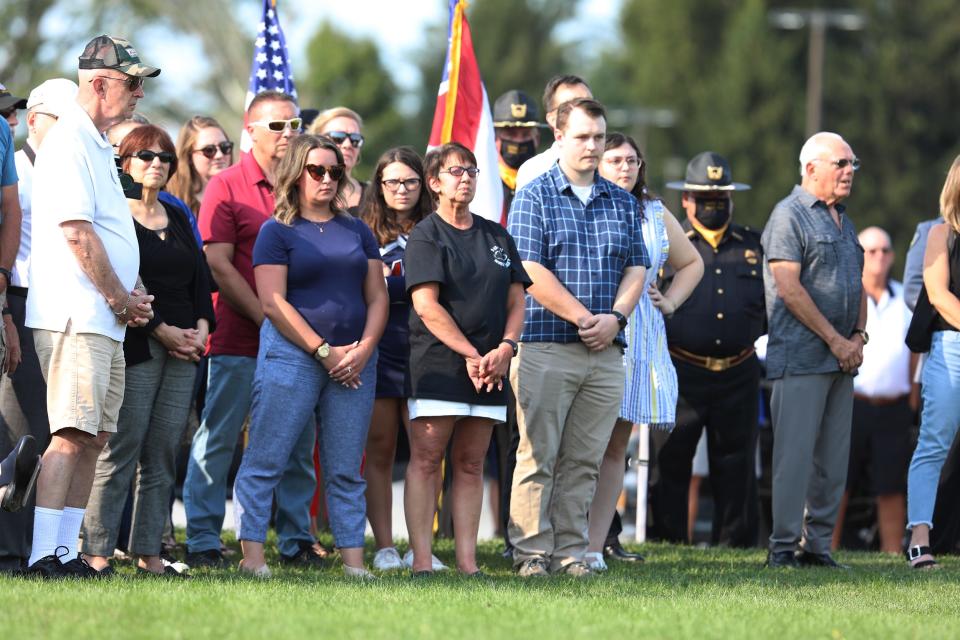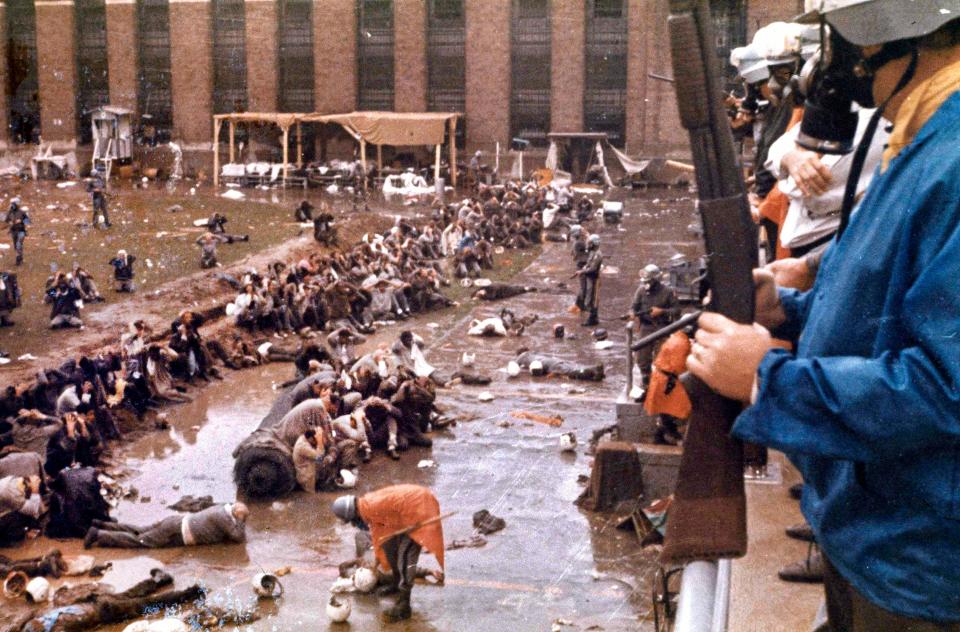New York apology is five decades overdue to victims of Attica prison
- Oops!Something went wrong.Please try again later.
A year ago, the 50th anniversary of the tragic 1971 Attica prison uprising was the focus of documentaries, of discussions about the carceral state then and now, and of a solemn remembrance that drew hundreds to the prison grounds in western New York.
This year, there is no significant anniversary nor any monumental milestone to prompt us as a society to revisit the uprising and the inhumane conditions that triggered it. Perhaps it is in this quieter moment that New York Gov. Kathy Hochul can do what her predecessors have refused to do: Apologize on behalf of the state.
The governor, like her predecessors, has been encouraged to apologize for the state’s culpability in the nation’s deadliest prison rebellion. As a western New York native whose home is less than an hour from Attica, Hochul knows the history of the uprising as well as any recent governor of the Empire State. When in Congress, she represented Wyoming County, where the prison is located.
“I know that there were a lot of lives just shattered, destroyed, and the memories still linger – whether you were a corrections officer in that desperate situation or you were a prisoner who was a victim of what occurred there at this time,” Hochul said last year.
Refusal to fix Attica conditions that led to prison riot
Why would or should the state apologize? I posed this question to Malcolm Bell, who was a special prosecutor charged with investigating possible crimes, including murder, committed by law enforcement during the prison retaking and after.
Speaking of the treatment of prison employees, slain hostages and their families, Bell answered: “The state kept the prison needlessly dangerous and refused to correct the conditions that sparked the riot. Gov. Nelson Rockefeller admitted that all the hostages could be killed when he prematurely sent in the police without a realistic plan to save them.
“The police killed 10 of (the hostages) and gravely wounded others in an unwarranted orgy of shooting. Then the state swindled them out of fair compensation, thus condemning several widows and their children to live in poverty. Yet one governor after another has refused to give them the apology they so obviously deserve and would mean so much to them – a refusal that continues to disrespect them and dishonor New York.”
We transformed NY police accountability: State leaders should follow suit
The Forgotten Victims of Attica
In the months before the uprising, inmates in the severely overcrowded prison were denied basic human and constitutionally guaranteed rights: The prison spent less than 70 cents a day on meals for each prisoner; there were weekly showers and a monthly roll of toilet paper for each incarcerated man; Black and Hispanic inmates were disallowed publications that were targeted to their populations outside of the prison; and Muslims were denied the ability to fully practice their religion.

The prison combusted on Sept. 9, 1971, and inmates seized control, holding dozens of employees hostage. Four days later, the New York State Police and other law enforcement stormed the prison, fatally shooting 29 prisoners and 10 hostages. Inmates were tortured and brutalized by police after the siege.
Nearly three decades later, New York brought an end to a long-simmering lawsuit by prisoners with a $12 million settlement. That resolution gave birth to an organization of surviving hostages, their families and the families of prison workers killed in the retaking. The organization, the Forgotten Victims of Attica, learned that state officials had, after the uprising, duped the widows of hostages into accepting workers’ compensation – a decision that precluded the widows from suing. Only one refused; she ultimately received over $1 million from the state.
Reform policing accountability: States need not wait on Supreme Court and Congress
The Forgotten Victims of Attica made five demands of the state, and they have received three fully – restitution of $12 million, assurances of an annual ceremony at the prison and counseling for any members who still wanted it. A fourth demand – the opening of sealed Attica-related records – was partly met, while a fifth – the apology – has yet to come.

Precedent, but so far not the will, for an apology
There is plenty of precedent for such an apology. Among a few: President George H.W. Bush apologized for the Japanese internment camps, President Bill Clinton for the racist Tuskegee experiments and also for our nation’s blind eye to Rwandan genocide, Ohio’s governor for the Kent State killings.
Opinion alerts: Get columns from your favorite columnists + expert analysis on top issues, delivered straight to your device through the USA TODAY app. Don't have the app? Download it for free from your app store.
A state legislative task force that negotiated with the Forgotten Victims in 2003 issued a report acknowledging that the prison conditions had been abysmal and that corrections officials were not prepared to confront an uprising like the 1971 rebellion.
But the task force said this of an apology: “We … believe government descends a slippery slope if subsequent administrations believe they have the authority to take their view of today’s standards and apply them retroactively to apologize for the decisions of their predecessors whose actions were based upon the prevailing contemporary social standards of our times.”

To this day, the statements of the task force exhibit an arrogant callousness on the part of the state of New York – a feeble attempt to justify treating the incarcerated men as less than human with claims that the prison conditions were the “prevailing” norm. They were not, nor can the decision to storm the prison instead of continuing with negotiations be disentangled from the lives lost and destroyed because of that decision.
Political calculations
Last year, Hochul vowed to connect with those who know the impact of the riot firsthand – survivors and families of those who lost their lives there. And there was a belief then that the governor planned to present the apology at the 50th anniversary ceremony at the prison.
How to prevent cops from killing: Weaken unions and make police pay for misconduct
Even the morning of the event, some thought she would show at Attica. She did not, and there have been rumblings that others in her administration – she was then only months into the job – convinced her that political calculations did not favor an apology.
Political calculations often smother that which is right, that which is just and that which is good. An apology would be all of those – right, just and good.
The apology is overdue. It is, in fact, long overdue.
Gary Craig, a reporter for the Democrat & Chronicle of Rochester, New York, has written extensively of the Attica uprising. He is the co-author of the memoir of Deanne Quinn Miller, “The Prison Guard’s Daughter: My Journey Through the Ashes of Attica.” Miller is a founding member of the Forgotten Victims of Attica and her father, William Quinn, was a corrections officer killed in the Attica uprising.
This column is part of a series by USA TODAY Opinion about police accountability and building safer communities. The project began in 2021 by examining qualified immunity and continues in 2022 by examining various ways to improve law enforcement. The project is made possible in part by a grant from Stand Together, which does not provide editorial input.
You can read diverse opinions from our Board of Contributors and other writers on the Opinion front page, on Twitter @usatodayopinion and in our daily Opinion newsletter. To respond to a column, submit a comment to letters@usatoday.com.
This article originally appeared on USA TODAY: New York Gov. Kathy Hochul, apology is long overdue to Attica victims

